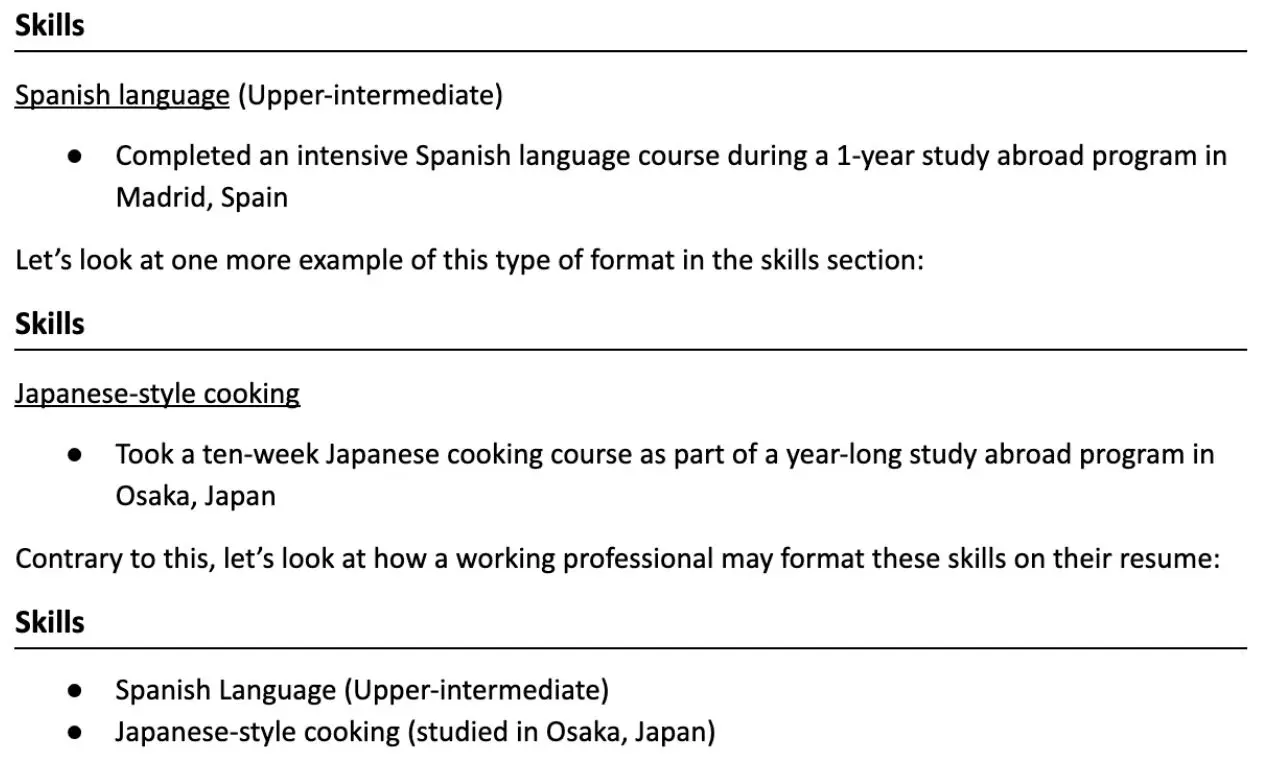Studying abroad is a highly regarded experience that not only expands your skillset but your mind as well.
People who have traveled and studied abroad can be more open-minded, and idea-driven, and can often communicate well with others!
How can you express this best on a resume?
How Do You Put Study Abroad Experience on a Resume?
How do you format a study abroad experience of less than one year?
How do you format a study abroad experience of more than one year?
How to include study abroad in the skills section
How Do You Put Study Abroad Experience on a Resume?
To put a study abroad experience on your resume, include it in the education section. It should be placed in its own line for experiences of 1+ years, or as a bullet point beneath the main school for shorter experiences. Include the country, school name, and length of study.
Because study abroad is an educational experience, it makes the most sense to put it in the education section on a resume.
Depending on the length of time studied abroad, the formatting will be different for each instance.
Short-term overseas study experiences are often done under the guidance of a main school in one’s home country.
These examples include summer/spring study experiences, single semester experiences, or 9-month experiences.
Educational systems, such as Japanese education, may have different calendar years than that of your home university or high school.
Keep the dates in mind when formatting, it may be best to refer to an experience as the dates, rather than as “fall semester” which can differ around the world.
How do you format a study abroad experience of less than one year?
For study abroad of less than one year, it is best to keep the experience as a bullet point beneath the main school from which you studied abroad. Include your main school’s name as the bolded one beneath the header and list the sub-school (study abroad) below, usually as a bullet point.
This will look like the following:
Education
Mt. Everest University (9-2014) – (5-2018)
BA in Engineering, Minor in interior design
- Studied abroad for 6 months at La Universidad de Madrid, Spain

Formatted version
Because it is in the middle of your education and is shorter than most educational experiences, it is best not to list it as an individual school.
List it as a sub-school as in the example shown, and it will stand out to an employer just as well.
How do you format a study abroad experience of more than one year?
Study abroad experiences of more than one year should be listed as their own school in the education section. List the school title, specify the location, and include the degree only if the degree was completed abroad. You may list the topic of study if it is relevant.
A year or more is an exceptionally long and impressive duration to have undertaken in a new country.
It shows independence, drive, and flexibility. For this reason, you want to make sure it stands out on your resume as its own section.
Keep the educational experiences in reverse chronological order, and if there is an ongoing education, it should be listed at the top.
Include the graduation date, or include the expected graduation date if you are still in school.
Let’s try an example of a two-year study abroad program:
Education
Mt. Everest University (9-2014) – (5-2018)
BA in Engineering, Minor in interior design
La Universidad de Madrid [Spain] (5-2015) – (5-2017)
Completed a year-long program abroad focused on Spanish language and engineering

Formatted version
Once professional experience has been gained, the description can be left off a resume for the study abroad program.
For newer graduates, this experience is particularly impressive and is best outlined to help them gain an edge over their peers.
If your resume is well filled out with working experience and it has been at least a few years since you graduated from university, it may be best to simplify your education section.
Abbreviations are recommended for the degree type.
You may choose to list your study abroad experience as a short bullet point, or you may leave it entirely to focus on real experience and skills.
To simplify your experience abroad on your resume in the best way, you can re-format it into a skill and include it in the skills section!
This is the best practice when you have skills you gained from the program, such as language or culture.
How to include study abroad in the skills section
Include the specific skills which were gained from the study abroad experience in the skills section. Whether they be language, culture, or a skill relevant to that country, keep it to 1-3 words, and you may place a short description below. Do not write this in a paragraph or full-sentence format.
When including a study abroad experience in the skills section, you should break it down and think of what knowledge or skills you gained over the course of your experience.
Language is always a welcome skill to include on a resume.
Depending on the desired job, it may be relevant to mention particulars.
Perhaps you studied interior design in Italy, or took cooking classes in Thailand! Sometimes the smaller details of your study abroad are the gateway to a good interview conversation, so include them wisely.
The skills section is not the place for long descriptions and many different details, so keep it brief.
While more experienced professionals may write “Spanish Proficiency”, those with fewer work experiences may include a short description of how they studied abroad for a year.
Let’s look at both of these examples more thoroughly. First, that of someone who has little working experience:
Skills
Spanish language (Upper-intermediate)
- Completed an intensive Spanish language course during a 1-year study abroad program in Madrid, Spain
Let’s look at one more example of this type of format in the skills section:
Skills
Japanese-style cooking
- Took a ten-week Japanese cooking course as part of a year-long study abroad program in Osaka, Japan
Contrary to this, let’s look at how a working professional may format these skills on their resume:
Skills
- Spanish Language (Upper-intermediate)
- Japanese-style cooking (studied in Osaka, Japan)

Formatted version
The skills in this case should be formatted simply, be straight to the point, and should be listed with additional details only if it makes them seem more impressive.
In this case, it is good to mention the cooking experience was gained abroad as it comes off as more authentic and professional.

Hey fellow Linguaholics! It’s me, Marcel. I am the proud owner of linguaholic.com. Languages have always been my passion and I have studied Linguistics, Computational Linguistics and Sinology at the University of Zurich. It is my utmost pleasure to share with all of you guys what I know about languages and linguistics in general.

